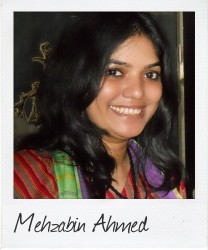“Protests in the name of justice”
April 6th, 2013 Recent arrests may change the dynamics of peaceful protest related to war crimes trials, writes Mehzabin Ahmed, 29, a Commonwealth Correspondent from Dhaka in Bangladesh.
Recent arrests may change the dynamics of peaceful protest related to war crimes trials, writes Mehzabin Ahmed, 29, a Commonwealth Correspondent from Dhaka in Bangladesh.
The dynamics and emotions of peaceful protestors at Shahbagh Projonmo Chottor (New Generation Circle) in Bangladesh are taking a new face with the recent arrest of a number of bloggers involved with the protests.
The government alleges they are defaming religion, which some argue is a step to appease fundamentalists in the country. University teachers, students, intellectuals, and masses of people organized protests against the bloggers’ arrest and demanded their immediate release.
Critics argue it is a clear violation of our constitutional right to freedom of expression and religion. Others are dismayed that this group of protestors at Shahbagh has faced many obstacles over the past two months, such as being dubbed anti-religious. There have been threats and shocking violence in the death of peaceful blogger activist Rajiv Haider, and the son of Rafiur Rabbi, one of the protest organizers of this Ganajagoron Mancho (People’s Platform) in Narayanganj, Bangladesh.
The day of April 6 started even bleaker as Hifazat-e Islam, a radical Islamist group from Chittagong, Bangladesh, allegedly backed by the war-crime associated Jamaat-e-Islami party, started its rally. Gathering in Dhaka, hundreds of thousands of their supporters demanded the death of alleged ‘atheists and blasphemous bloggers’ of the Shagbagh’s Ganajagaran Mancha. The Hifazat-e Islam not only barred women from its rally in the capital on Saturday, but also physically and mentally harassed several female journalists performing their professional duties there. It has threatened to lay siege to Dhaka on May 5 if the government does not meet their demands, including banning women from appearing in pubic with men.
Protests in Shahbagh, Bangladesh started on February 5th, 2013, and people from all walks of life continue to gather with deep wounded sorrow against our war criminals. The protest saw its peak when hundreds of thousands across the nation gathered in support of the movement, demanding punishment against war crimes more than four decades old. They asked for a ban on religion-based politics, especially on the parties of Jamaat-e-Islami and its student wing, Shibir, whose leaders have been convicted by our International Crimes Tribunals.
The unfolding event probably saw its darkest moment when the brother of freedom fighter Ahmed Imtiaz Bulbul was found brutally murdered. At the time Bulbul was a prosecution witness testifying in war crime proceedings against former Jamaat-e-Islami Chief Ghulam Azam.
The peaceful and yet aggrieved protests across the nation erupted with demands for execution of all war criminals when Quader Molla, feared as the Mirpurer Koshai (Butcher of Mirpur), was convicted by the International Crimes Tribunal and handed life imprisonment. He was accused of more than 300 murders and the rape of civilians during the Bangladesh War of Independence in 1971. While international critics argue capital punishment may not be the answer, our nation’s people are angered by the fear that he and other hated war criminals will get political amnesty as soon power revolves. The defendants have been accused of genocide, mass murder, and mass rapes.
We as a nation stand even more aggrieved and angered as their affiliates go on rampage, attacking the symbols of our nationhood, attacking at the hearts and prayer grounds of the religious minorities of our once-envisioned secular nation, and attacking the innocent, including journalists and members of our law enforcement agencies. And even worse, as they cry out against women’s right and freedom in the name of religious fundamentalism in our otherwise quite progressive country.
It has turned into a playground of moral warfare – justice-seeking, secular, and patriotic peaceful protesters versus fundamentalist, alleged war criminals and their supporters. I suppose our pens, html scripts, and voices are too much of a force for them. They seem to want to impose silence with their sharp-bladed swords and brazen guns. Unable to face the wrath of our logic and the loud volume of our cries for their long-awaited punishment, they try to numb us into silence with gruesome murder and blood. They forget that silence speaks louder than words, and they forget that much as bombs and arson might scare us, they will never win our support.
During the Bangladesh War of Independence in 1971, an estimated three million people were killed and between 200,000 and 400,000 women were raped by Pakistani military and paramilitary forces. An estimated ten million refugees fled to India from Bangladesh. However, it has taken more than four decades of our independence to bring the war criminals of this atrocious conflict to trial.
George Harrison, Ravi Shankar, and the great souls of the ‘70s once played the Concert for Bangladesh to bring awareness against this genocide in Bangladesh. Sadly, as someone recently noted about international silence on the issue of punishment for alleged criminals and their continued injustice and violence, “No one sings for Bangladesh no more”.
…Weary of struggles, I, the great rebel,
Shall rest in quiet only when I find
The sky and the air free of the piteous groans of the oppressed.
Only when the battle fields are cleared of jingling bloody sabres
Shall I, weary of struggles, rest in quiet,
I, the great rebel…
Excerpts from Bidrohi (The Rebel) – By Bangladesh’s National Poet, Kazi Nazrul Islam, Translated by Kabir Chowdhury
…………………………………………………………………………………………………………………
About me:
“I come from Bangladesh, home to the Royal Bengal tigers and the longest natural beach in the world. I am passionate about working for sustainable solutions to development. I currently work as a development practitioner in Dhaka, Bangladesh. I am also a freelance journalist and a novice debater.
“I am bilingual in Bangla and English. I love learning new languages, and am a keen but elementary student of French. What I have learnt from wise words and life experiences is that, “If you want others to change, you have to be willing to change yourself as well”. Feel free to call me Simi.
…………………………………………………………………………………………………………………
Opinions expressed in this article are those of the author and do not necessarily represent the views of the Commonwealth Youth Programme. Articles are published in a spirit of dialogue, respect and understanding. If you disagree, why not submit a response?
To learn more about becoming a Commonwealth Correspondent please visit: http://www.yourcommonwealth.org/submit-articles/commonwealthcorrespondents/
…………………………………………………………………………………………………………………






